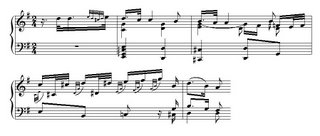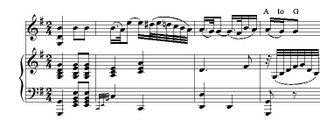With a howl of loyalty
the spring storm shakes my ark,
oh my lost ones.
(tr. Edith Farnsworth)
You are introduced, the crowd is applauding, the theatre is dark, and you walk onstage, weaving towards the piano; you bow and before you know it you are seated and you are staring at this:

How can you thank a composer sufficiently for giving you something like this to play? It is not one of those delicate, evasive beginnings whose success depends on the pinpoint execution of a number of small details, in the heat of the initial moments. You begin with a few strums, as if trying out the keyboard, and before you know it you are mid-inspiration: in the throes without even trying. It is so generous, it seems to express love but in every possible direction, plurally, democratically, towards the piano, towards the listener, and even towards lowly me the performer. And you just let it fly. There is only one puzzling moment, at the end of the provided example: I have "gotten stuck" here so many times, wondering how to play this descending fourth, G to D; a pothole in the too-perfect road; at this moment, Mozart, instead of spinning out perfect, inevitable melody, seems to be "treading water," merely filling in the harmony with an unexpressive interval... Do I play the low D as if Mozart is reaching into the underlying harmony, into another voice? Or is it part of the main melody? Luckily, just at this odd, flagging moment, the left hand interjects another strum and this seems to wake up the right hand, which leaps into another (perhaps even more unbelievable) phrase: we are back on top, baby.

I believe this "odd flagging moment" to be an intentional flaw, the one thing to make the magic melody not work. Why would Mozart choose to fail, even for a moment? Because when the violin enters, playing the same melody, and it comes to the same juncture, it "corrects the problem":

Between the piano's G-D, and the violin's A-G, an enormous abyss. The piano's resolution was non-committal, structural, neutral, a girder at the end of the phrase, holding it (classically, at a distance) in place; while the violin's resolution is made of flesh, sound, sensuality; the sweetness of the violin's suspension somehow finally encapsulates, expresses, condenses the generous loving idea which the piano has set forth. In that one aha! moment, the violin shows the piano how it should have been done, and brings the ecstasies of the opening down to earth. But if the piano had played the violin's resolution earlier, at measure 4, the piece would have been prematurely complete; so the piano "had" to fail. The piano had to look for a second phrase to answer the questions of its first, but the violin makes it clear that the answer was already innate in the opening statement: that we need look no further. Rather than two paired question-answer phrases (the paradigm of classical rhetoric) we have a beautiful symmetrical setup where the initial question becomes the answer.
This resolution (over which I realize I am obsessing), in one of those beautiful paradoxes native to music, brings one motion to an end, and sets the piano on another motion: the aha! moment is the elision of the end of one endless arc, and the beginning of another: the intersection of paradises. Speaking of intersections, yesterday I was playing the "Kegelstatt" Trio, and the page turner and I were having a delightful time, like conspirators back there, because I was excessively drawing her attention to some delicious things that happen in the left hand of the piano in the last movement. You have your thematic moments, you know, when the bass has a kind of purposeful, defining motion ("boring" as such), and then you have these great moments where Mozart slips into a kind of vamp, where the bass just oscillates tonic-dominant or vice versa, and there are these simple little bassline ideas, snippets, making their smiling statements down there.... Mozart draws us into vamp hypnosis, letting us enjoy the wandering, and then--and then--just when are going under, just when the vamp nears vapidity, the theme reappears out of a twist of events, and the bass becomes happily disciplined again, does lovingly its dutiful thing, and those moments at the intersection--in which the theme, a mere thing, appears like revelation--are so wonderful you just want to kiss somebody or something. Unfortunately this is usually not appropriate onstage, and a musical moment is very hard to kiss, except by playing it just so. So it floats on by, the kissed or unkissed moment; you play it the best you can; oh my lost ones.
No comments:
Post a Comment